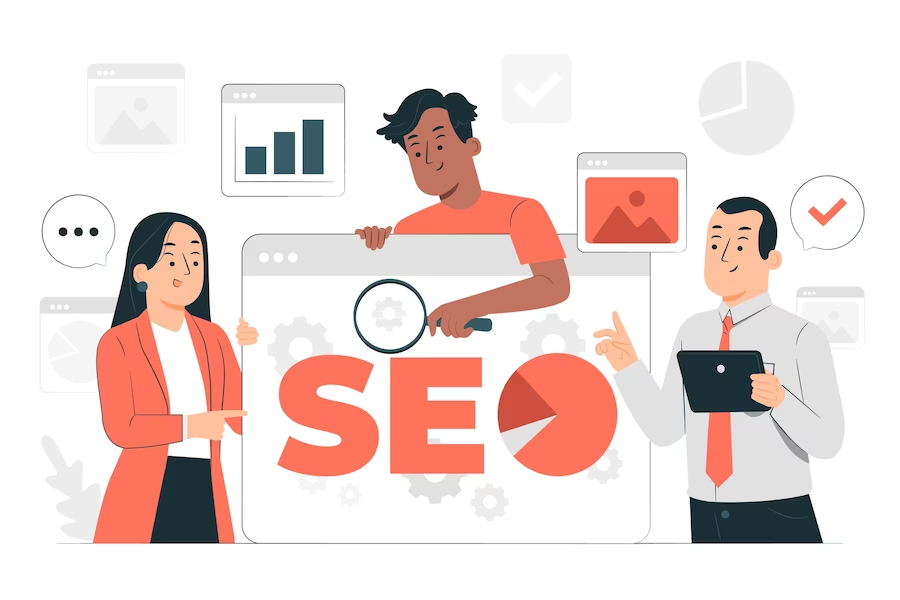7-common-myths-and-misconceptions-about-on-page-seo
-
- Date
Search Engine Optimization (SEO) is a dynamic and ever-evolving field, and as such, there are often myths and misconceptions that can mislead website owners. On-page SEO, in particular, is a critical aspect of optimizing your website for search engines. In this article, we'll debunk seven common myths and misconceptions about On-Page SEO to help you navigate the intricacies of optimizing your content effectively. It's a widespread belief that cramming a webpage with keywords will boost its ranking on search engines. However, this needs to be clarified. While keywords are essential, the focus should be on creating high-quality, relevant content. Search engines have become more sophisticated, and they prioritize user experience. Instead of obsessing over keyword density, focus on providing valuable information that caters to your audience. Many website owners think that optimizing their pages for search engines is a one-and-done task. In reality, SEO is an ongoing process. Search engines continually update their algorithms, and your competitors are also optimizing their content. Regularly updating and refreshing your content, monitoring analytics, and adapting to industry changes are crucial for maintaining and improving your search rankings. Some believe that meta descriptions are insignificant in the grand scheme of On-Page SEO. However, well-crafted meta descriptions can significantly influence click-through rates. While they may not directly impact search rankings, compelling meta descriptions can entice users to click on your link, increasing your organic traffic. Therefore, pay attention to this crucial aspect when optimizing your pages. In the early days of SEO, some practices involved manipulating search engine algorithms to achieve higher rankings. However, search engines have evolved, and modern algorithms prioritize user experience. Engaging in black-hat SEO practices, such as keyword stuffing or buying backlinks, can result in penalties and harm your website's credibility. Focus on ethical, user-centric strategies for sustainable success. There's a misconception that the length of your content doesn't matter for SEO. While no magic number of words guarantees a higher rank, studies suggest that longer, comprehensive content often performs better. This is because it allows you to cover a topic in-depth, providing more value to your audience. However, quality should always take precedence over quantity; ensure your content is informative, engaging, and meets the needs of your readers. While backlinks are an essential aspect of SEO, the quality of those links matters more than the quantity. Acquiring numerous low-quality or irrelevant backlinks can hurt your rankings. Instead, focus on building high-quality, authoritative links from reputable sources within your industry. A few quality backlinks can provide more significant benefits than a plethora of irrelevant ones. Some believe that SEO is solely about making changes to please search engines, neglecting the user experience. However, the reality is that search engines aim to provide users with the most relevant and valuable content. Aligning your optimization efforts with user needs and expectations will improve your search rankings. Best SEO services prioritize creating a seamless, user-friendly experience, and search engines will likely reward you for it.Common Falsehoods and Illusions Regarding On-Page SEO

Myth 1: Keyword Density is the Sole Determinant of On-Page SEO Success:

Myth 2: SEO is a One-Time Effort:
Myth 3: Meta Descriptions Have No Impact on SEO:
Myth 4: SEO is All About Gaming the System:
Myth 5: Content-Length Is Irrelevant:
Myth 6: The More Links, the Better:
Myth 7: SEO is Only About Appeasing Search Engines:
In conclusion, understanding the truth behind these common myths and misconceptions about On-Page SEO is crucial for developing an effective optimization strategy. By focusing on providing value to your audience, staying updated on industry trends, and maintaining ethical practices, you can enhance your website's visibility and improve your search engine rankings over time. SEO is a continuous journey, and dispelling these myths is the first step toward achieving sustainable success in the digital landscape.



July Mao
The topic you describe here is really important. However, the mentioned type of training cannot be applied to anyone.
John doe
You are absolutely right! But here, we have everything necessary to prepare even the pre - beginners to extensive physical training.
Mila MOa
Very useful post! Thanks for sharing! Now I’ll be planning my visit to your gym to take part in some fitness classes.